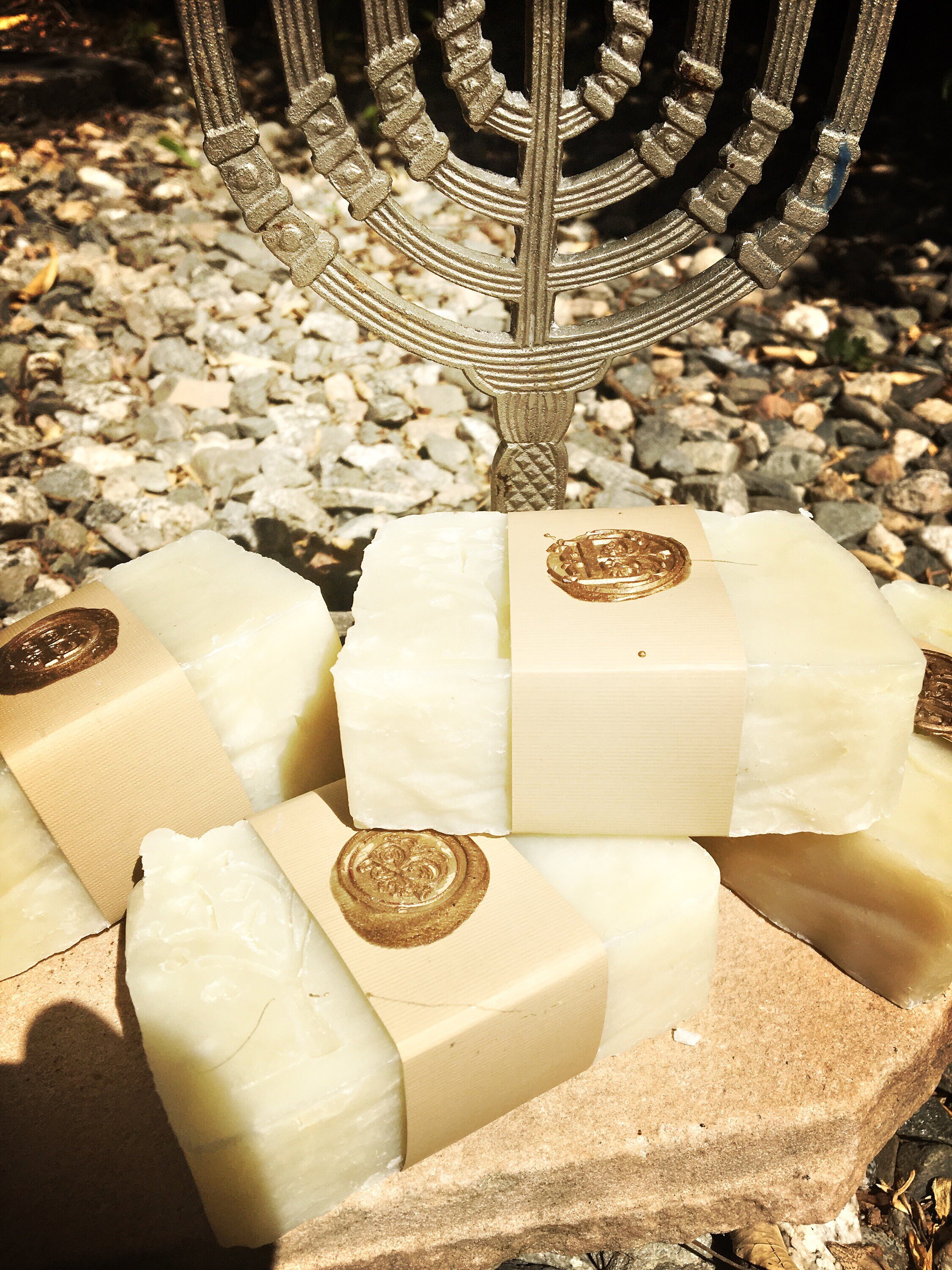 Image 1 of 3
Image 1 of 3

 Image 2 of 3
Image 2 of 3

 Image 3 of 3
Image 3 of 3




Biblical
Biblical is an amazing historically inspired soap. This one is special in so many ways, and besides smelling amazing, it has roots in ancient history as well as having some fantastic medicinal benefits.
The ancient Middle East has a rich tradition of soap making. Soap-like material found in clay cylinders during the excavation of ancient Babylon is evidence that soap making was known as early as 2800 B.C. Inscriptions on the cylinders say that fats were boiled with ashes, a soap-making method that I use to this day!
Moses gave the Israelites detailed laws governing personal cleanliness. Biblical accounts suggest that the
Israelites knew that mixing ashes and oil produced a kind of gel that could be used on hair. Soap is mentioned twice in the Bible, but it is generally agreed that the Hebrew word “borith,” which has been translated as soap, is a generic term for any cleansing agent made from wood or vegetable ashes. What woods did they use? While no direct recipe exists, what I use would be well known to the ancient Israelites and most definitely were readily available to them. Here’s what I used:
Cedarwood oil was well known to the ancient peoples of the middle east. has anti-inflammatory and antimicrobial properties. This may make it beneficial for skin conditions like acne. One case study indicated that the addition of cedarwood oil to traditional acne treatments was helpful for alleviating and reducing stubborn breakouts.
This Soap contain mud from the Dead Sea.Dead Sea mud is some of the most mineral-rich mud on Earth, containing a total of 21 minerals! The list of minerals includes sodium, magnesium, calcium, bromine, iodine, zinc, bitumen, sulfur, and potassium. Many of these minerals have known therapeutic, detoxifying, relieving, and healing properties. Biblical also contains the famous Frankincense. Besides being mentioned in the Bible as one of the three gifts to the baby Jesus by the Three Wise Men, Frankincense was well known for its healing properties. It helps in healing wounds, sores, ulcers, carbuncles, hemorrhoids, and inflammations! Frankincense also possesses antiseptic, and astringent properties.
Finally, I add orange. Besides smelling fantastic, the locally grown oranges I use have beneficial properties as well! Orange oil stops microbe activity, its scent is used as an aid against anxiety and depression. It can also be used for mild pain relief. It’s a natural insecticide too!
No soap from the Middle East would be complete without Olive Oil, so I make this with 100% Organically grown Virgin food grade olive Oil imported from Italy.
Yup, this is truly a soap of biblical proportions. And yes...it's all kosher. :-)
Biblical is an amazing historically inspired soap. This one is special in so many ways, and besides smelling amazing, it has roots in ancient history as well as having some fantastic medicinal benefits.
The ancient Middle East has a rich tradition of soap making. Soap-like material found in clay cylinders during the excavation of ancient Babylon is evidence that soap making was known as early as 2800 B.C. Inscriptions on the cylinders say that fats were boiled with ashes, a soap-making method that I use to this day!
Moses gave the Israelites detailed laws governing personal cleanliness. Biblical accounts suggest that the
Israelites knew that mixing ashes and oil produced a kind of gel that could be used on hair. Soap is mentioned twice in the Bible, but it is generally agreed that the Hebrew word “borith,” which has been translated as soap, is a generic term for any cleansing agent made from wood or vegetable ashes. What woods did they use? While no direct recipe exists, what I use would be well known to the ancient Israelites and most definitely were readily available to them. Here’s what I used:
Cedarwood oil was well known to the ancient peoples of the middle east. has anti-inflammatory and antimicrobial properties. This may make it beneficial for skin conditions like acne. One case study indicated that the addition of cedarwood oil to traditional acne treatments was helpful for alleviating and reducing stubborn breakouts.
This Soap contain mud from the Dead Sea.Dead Sea mud is some of the most mineral-rich mud on Earth, containing a total of 21 minerals! The list of minerals includes sodium, magnesium, calcium, bromine, iodine, zinc, bitumen, sulfur, and potassium. Many of these minerals have known therapeutic, detoxifying, relieving, and healing properties. Biblical also contains the famous Frankincense. Besides being mentioned in the Bible as one of the three gifts to the baby Jesus by the Three Wise Men, Frankincense was well known for its healing properties. It helps in healing wounds, sores, ulcers, carbuncles, hemorrhoids, and inflammations! Frankincense also possesses antiseptic, and astringent properties.
Finally, I add orange. Besides smelling fantastic, the locally grown oranges I use have beneficial properties as well! Orange oil stops microbe activity, its scent is used as an aid against anxiety and depression. It can also be used for mild pain relief. It’s a natural insecticide too!
No soap from the Middle East would be complete without Olive Oil, so I make this with 100% Organically grown Virgin food grade olive Oil imported from Italy.
Yup, this is truly a soap of biblical proportions. And yes...it's all kosher. :-)
